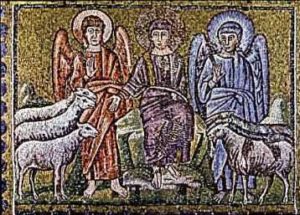- To be profiled, targeted, accosted, and shot dead is to be among “the least,” unseen, unheard, misunderstood, and denied help. It is to be among people Jesus sees, hears, understands, and treats as Family.
- To diminish or dismiss, to deny or deflect, to excuse or “explain” the horror of this is to align with the goats and not the sheep, and to deepen the horror.
- All who have authority and opportunity will turn and walk toward the “least,” or not.
- At some point, nothing will matter more than which way we turn and walk.
In one of Jesus’ most striking teachings he envisioned the final judgment where the Son of Man will sit upon his Throne and will gather the nations to him (Matt. 25:31-46). Apparently, the Lord who is King will not only judge individuals but also nations or groups. Yes, imagine it, citizens of the U.S., of Uruguay, of Russia, of Rwanda, of Switzerland, of Swaziland, of Norway and North Korea, Island people and tribal nomads, from all compass points—all the nations/people groups assembled before the Throne. I think it matters what group shapes our identity, what groupthink filters our perceptions, and what group-assumptions, attitudes, actions and reactions just feel normal or necessary to us. The groups, networks, parties, clubs to which we pledge allegiance will be subject to the King’s review and judgment.
But the King does not judge the groups, per se, as if some are inherently heep-like and others goat-like. Rather, he separates out the sheep and the goats from the mass gathering of the nations. This is important. No nation or people-group gets a pass, no group is presumed righteous until proven wicked.; indeed—no nation, as such, is necessarily good or bad, unclean or holy. No, from among all the nations will come both sheep and goats. No individuals have an advantage before the King simply because of group-origin or identity.
Instead, here is the decisive question: how are “the least” seen, heard, understood, and helped? Those to the right of the Throne will be overjoyed when the King praises them, but they’ll be surprised to find out why. Likewise, those to the left of the Throne will be mortified to hear the King rebuke and banish them from his presence, and then all the more shocked to learn why. In both cases, in seeing, hearing, understanding, helping “the least” they were in effect doing it to and for the King. Or, not!
I have pondered this element of surprise. Normally we know when we’ve done well, and also when we have failed to do what is right or good. Normally, deep down we know. How is it, then, that in this final scene both sheep and goat are surprised? How can they be so unaware?
Well, the difference between the sheep and the goat goes deeper than the obvious. Obviously, the sheep have seen, heard, understood, and helped “the least”—whom Jesus describes as hungry, thirsty, foreign or strange, naked, diseased, and imprisoned. And there’s one final way Jesus describes them: as siblings. One group cared for the needy and the other didn’t. Both respond to them unaware that Jesus regarded the needy as his beloved sisters and brothers—to do for them was to do for him. One group cared and the other didn’t; both groups knew what they were doing, but not all they were doing.
I suggest the surprise of the sheep, who cared, reflects hearts in tune with the King’s heart, who didn’t think of self but emptied self, surrendered self, and exhausted self to help all the others of every group in whatever the place. From the King’s heart of hearts flowed passionate desire to help the needy, the vulnerable, and the threatened.
And, I suggest, the surprise of the goats, who did not care, reflects hearts not in tune with the King. Unaware of the least around them or unmoved by their plight, they could never have dreamed that Jesus was among them, waiting for someone like them to help. If only they had known. If only someone had told them. Thus, they are surprised by the truth which now seems so unjust!
So, again:
- To be profiled, targeted, accosted, and shot dead is to be among “the least,” unseen, unheard, misunderstood, and denied help. It is to be among people Jesus sees, hears, understands, and treats as Family.
- To diminish or dismiss, to deny or deflect, to excuse or “explain” the horror of this is to align with the goats and not the sheep, and to deepen the horror.
- All who have authority and opportunity will turn and walk toward the “least,” or not.
- At some point, nothing will matter more than which way we turn and walk.
Followers of Jesus of whatever people group will at least practice the golden rule—act toward the profiled, targeted, accosted, and killed, (and their families and friends) as you would have them act toward you. At most they will deny self, take up a cross on their behalf, counting on resurrection to turn tides of tragedy to scenes of shalom.
Perhaps in between the least and the most we can do, to love those numbering among “the least” will involve the prayers we make, the words we use (and those we won’t), the conversation we listen to or not, the group-think we assess to affirm or to counter, the alliances we have and whether we continue them, the measures to protect the vulnerable that we make, propose, support and enact, and the measures necessary to prevent their abuse. Along the way, we might also form or deepen relationships with some who are different and discover a means of grace to see, hear, love and follow the Lord Jesus who treats us all like Family.
Please, Lord, make it so!
